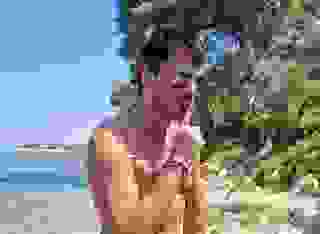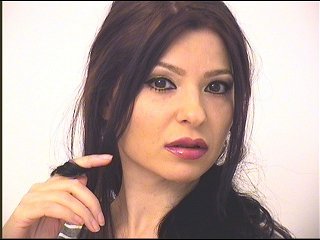- Gay Male
- Journey of Rick Heiden Ch. 31-32
Note: You can change font size, font face, and turn on dark mode by clicking the "A" icon tab in the Story Info Box.
You can temporarily switch back to a Classic Literotica® experience during our ongoing public Beta testing. Please consider leaving feedback on issues you experience or suggest improvements.
Click hereAll Rights Reserved © 2019, Rick Haydn Horst
This is a work of fiction. Names, characters, businesses, places, events, locales, and incidents are either the products of the author's imagination or used in a fictitious manner. Any resemblance to actual persons, living or dead, or actual events is purely coincidental.
CHAPTER THIRTY-ONE
I met Meridia, cousin to Amaré and second eldest on Jiyū, during my study of the ancient texts at the Archive. She seemed a fascinating and capable woman. As her former student, I could tell David respected her. If she had taken book eight, it could have significance. I had many questions of her and Amaré. Such as, why after the invention of the youth enhancement, did the population plummet? As the eldest, they must have known the answer.
After our discussion with Neal, we awaited Venn to gather us at the curb to travel to the industrial area. An unusually quiet David refused to touch me to demonstrate how perturbed he felt, and this preceded our first spat before Venn's arrival.
David shifted the box in his arms and glared at me with the disagreeable scowl that he had never directed at me. "You have no idea what you've gotten us into."
"Oh relax, if Neal hasn't lied, this might prove itself worthwhile."
"As reasonable as that may sound to you," said David, "somehow he planned this. He knew we waited for his arrival. He's tricked you into agreeing to do his dirty work."
"How?"
"By acting as the foppish, pretentiously ineffectual manipulator that comes so naturally to him, and by making it sound as though he wanted nothing more than a simple secret. If a secret does exist, it's probably dangerous. Amaré would only keep secrets due to their importance."
"I'm sorry. I admit I didn't think."
"I noticed. I attempted to talk Neal into telling us without the deal, and you ruined it. The next deal that needs making, we make it together."
"Okay, I apologize," I said. David, holding the box, half hugged me, indicating that he forgave me. I then thought of something just as Venn came into view. "Amaré only spoke Japanese before Pearce left for Earth. Does Pearce speak Japanese?"
"No, he doesn't," said David.
"If Amaré has kept Aurum's secret, and Pearce knows it, as Neal seems to believe, he must have heard it from someone who spoke English."
"That's a thought," said David, "but I feel manipulated. He only wants to satisfy his hyperactive curiosity."
To reach the industrial area by transport, one must travel the length of Central Avenue. We passed through the main tunnel, which provided a few minutes of respite from the broiling sun. The wind created by the motion of the vehicle did nothing to alleviate the heat. Thankfully, Venn equipped each transport with emergency water on such days, which we used to keep ourselves hydrated and rinse the taste of Teresa's weed residue from our mouths.
On the way, we passed the Arena. With my first viewing of it, the pre-sunrise light and our extreme proximity provided too narrow a scope, and it impaired my view. One must stand back to appreciate it. I admired the architect's Jiyū-esque façade. The style combined features of Rome's ancient classical architecture with a surprising element: Italian Baroque. It evoked the image of a dynamically enlarged Roman Colosseum, reimagined in its original form, then made Baroque. I realized the artists of Jiyū did that well and often. I saw the Baroquialization of various established architectural styles as Jiyū's hallmark. In honesty, it would have gotten its share of critical condemnation on Earth, but I considered it unique and worthy of interest.
After having a quick view of the Arena, we passed many blocks of buildings completed in a similarly blended style. An expanse of open space, along the road to the left of us, lay among them. Before it stood a white granite colonnade, doubling as a rail trestle, used as a visual enclosure for the open square. Venn informed us of the new square, called the Quadrātum --an unusual word whose unimaginative Latin translation merely meant square-- would replace the old city square by the sea. The Quadrātum consisted of a rectilinear space, 4 hectares of land, or almost 10 acres. Aurum had planned it during his days as Prime. The surrounding buildings also came under construction at the same time and appeared two-thirds finished. The focal building in the middle that faced Central Avenue looked like a public building of some sort. Its vast size and appearance reminded me of Il Vittoriano in Rome. The left side of the square contained a double-sized replica of ancient Rome's Pantheon. The reason for doubling it, Venn couldn't say. On the right side of the square sat the largest train station in One City, rivaling the Waterloo station in London for how many lines it could service. They intended it as a long-term station to all future cities, provided One City didn't extend to the entire planet. Several armies of bots labored on the buildings and laid the interconnected stones for the open square.
I could see the detailed planning that had come into play for the veritable Ancient Rome they erected, but oddly, I didn't care for it. Its ambiance felt far less organic. Even if they had planned the inner portion of One City to the Nth degree, it exuded a sensibility that spoke of more than just stone and mortar. The older part had a heart that made One City a masterpiece, as I had come to see it. When finished, I figured that its beauty would stun me, and I might lose my reservations, but it had far to go before it could compare to the portion I loved by the sea. Until completion, however, I elected to reserve a definitive judgment.
Once outside the visual distraction of the city, we saw nothing but kilometers of flat scrubland, without a single tree in sight. I grew curious about its geology, so I asked Venn. Although people often referred to the area as the plains, due to its vastness and flatness, they should call it the lower plateau, which ended at the foot of the mountain.
"This plateau has scant vegetation due to the lack of sufficient soil," said Venn. "Beneath us lies a solid slab of igneous rock over 255 thousand square kilometers in area."
"Well, that sounds impressive," I said, "but can you compare it to something I might recognize?"
"I can," he said. "It's the size of Oregon, the bulk of which you can see to the north of us."
"So far, we only use this lower edge," said David. "Just beyond the industrial area to the east, you will find the valley and the upper plateau beyond that. But here's something that might impress you," he said then pointed downward, "the Master Builder tunneled a gigantic cylindrical aqueduct through the granite beneath this road. Aurum had it built to channel the rainwater away from this side of the mountain to prevent flooding."
"Okay, I'm impressed. Where's the exit?"
"When it rains," he said, "the floodwaters pour into the Vallis River."
I saw no clouds, trees, or much of anything else to break up the visual monotony of white stone meeting deep blue sky. As the sun beat down upon us like ants beneath a magnifying glass, David asked Venn to make the ride more comfortable. The short windows surrounding the seating area of the transport rose all around us, meeting in the center above us. The entire upper portion turned opaque white, as Venn encapsulated us with a 360° view. The transport must have had climate control because the air began to feel more temperate and less humid.
The slow pace of the city transports annoyed me. It took an hour to traverse the 70 kilometers of scrubland, as cargo vehicles traveling both directions on the four-lane road passed us. They carried supplies and food to distribution points in the city, and recycling, along with other waste, from pickup points to the reclamator for processing.
Upon arrival, we rode through the middle of hundreds of warehouse-like buildings and saw a high concentration of robotic workers. Unlike the docks in Mumbai, the bots on the industrial side of One City kept the area immaculate, as well as organized.
Venn took us to an isolated warehouse to the south, referred to as the icehouse. For reasons unknown, they separated it from the others by a half-mile of narrow road.
They built all the warehouses of stone block, surrounded by an all-encompassing conductive mesh which acted as a Faraday cage. Ornate lightning rods adorned the titanium alloy roofs --titanium is a poor conductor of heat and electricity. With the severity of the electrical storms on Jiyū, it all seemed appropriate.
The icehouse sat alone on the blistering, sunbaked day with the broad side door left open. Four transport vehicles sat in the parking lot, and the group of people inside turned as our arrival drew their attention.
I saw those people I expected to see, Gabe, Magnar, Aiden, and Laurel, but Maggie also attended, and Dmitry, whom I had yet to meet. His short, loose curls appeared jet black in the shade and midnight brown when he entered the sunlight. He wore a scarlet-colored Trust uniform like Amaré and Gabe, but without the gold embellishments. His eyes narrowed from the excessive light, giving him a masculine appearance with an expression of deep contemplation. He greeted David with a suspicious enthusiasm that hinted he might approach David later as Liander warned us.
Maggie had already shopped for clothes as she wore cream-colored pants and a loose-fitting shirt of the same color. She had dressed for the weather. Carrying a wide brim hat, she greeted me, smiling for our customary hug.
"I didn't expect to see you until I got home," I said.
"You should know I will want to help," she said in her lovely French accent.
"Should I inquire about your legs?"
"They hurt," she said.
I hugged her again. "Time, food, and rest will work wonders, my dear."
David introduced Dmitry to me, and I noted something familiar about him. It took me time to discern, but after hearing him speak a few times, my translator's ear had noticed a curious similarity between Dmitry's voice and that of Amaré. Of course, they sounded distinct from one another. They had different vocal cords, palettes, nasal passages, and the subsequent differences in resonance that accompany those things, but they had the same tonality, elocution, and use of language, which struck me as bizarre. Amaré said he asked Dmitry to share with him his English. I wondered then if I saw what the Sharing does. As someone who understands language as I do, I observed that more than an exchange of information had occurred between them. If Dmitry had given him nothing more, Amaré would speak English as he would naturally speak it. However, until that moment, I had no idea that Amaré's English embodied a literal clone of Dmitry's. It disturbed me, and I recognized something important in that, but I needed time to ponder it.
"Mr. Heiden," said Dmitry, "I have heard much about you from Amaré. I look forward to reading your translation of the ancient texts."
"I look forward to doing that when I have time," I said.
"That will begin soon enough," said David. "For now, we have a drone to investigate." Determined to get to the business we came for, he stalked into the building, and the rest of us followed.
They had left the warehouse empty, except for a pale wooden table in the center, lit by one of the many sunlight tubes that illuminated the space. The drone, strapped upon the table, looked 2 feet wide and masked in green camouflage. It had four retractable legs, two sets of swiveling wings, and eight motorized propeller fans. The bottom front of the drone held a turret camera. I brought myself eye level with it but jumped back when the lens turned to stare at me.
"It's still active," I said, standing.
"Yes, and in a moment, you'll know why," said Aiden to me. "As you can see, David, it appears something has knocked four of the propeller fans out of alignment, leaving it easy to capture."
"Still no sign of the other one?" asked David.
"No," said Laurel, "and I have given that some thought. Rom assumed the drones had hidden in the city until morning so they could finish their task of scanning the city, but I don't think they did. The lighting outside prevented any further scans, so I think they hid for a while to let it become dark, and they both left. Somewhere along the way, this one sustained damaged. The team caught it near the tracks of station 10 East. We think it may have received a glancing blow from behind by the train."
David sighed. "Fascinating. I agree with you about the other drone. At this point, with no sign of it, that sounds like a reasonable explanation. What have we learned from this one?"
"A few things," said Aiden, nodding. "They made it phenomenally light. Along with its sophisticated electronics and power supply, they filled it with a long bag of hydrogen noodled throughout its interior, reducing its weight. That should make it more susceptible to problems with the wind and make it less stable, but it flies like an airplane to compensate for such difficulties. Thanks to Cadmar, we also discovered they booby-trapped it which explains why we haven't deactivated it. It does have a poorly copied Jiyūvian style power supply, which leaks insignificant amounts of radiation. They took advantage of its questionable stability because if you open the case, it will explode, set off by the hydrogen bag."
"With the radiation," I said, "should we move away from it?"
"Don't worry," said Laurel, "it's negligible."
"Can it hear us?" asked David.
"Cadmar didn't see any microphones," said Aiden, "but something does worry me more than anything else about it."
"What?" I asked.
"If you'll look here," Aiden said, pointing to an unusual bit of structure to the underside of the drone. "They're magnetic catches. Laurel and I have debated this. She believes they provide a means to tether the drone down, and perhaps they do."
"I still believe that," said Laurel.
"What worries you, Aiden?" asked David.
"I think they lightened the drone to compensate for a load it carried," said Aiden. "I couldn't say what, but if Major Palmer remains consistent, we might have an electromagnetic pulse generator in the city or something similar. They do appear to have made a successful miniaturized version of them; I suspect they're basing them on our technology."
"I don't like the sound of that," said David, "especially since we left an EMP generator lying at the bottom of a canal in Venice."
"What about surveillance devices?" I asked. "The Americans enjoy spying as much as the British."
"True," said David, "and no disrespect to your opinion, Laurel, because I hope you know how much I value you, but I think we must consider worst-case scenarios as a matter of prudence. Aiden could be mistaken, but if his idea proves correct, and we did nothing...well, I prefer not to take chances. I would have thought of explosives, but we saw this before with the drone case in Venice." David turned to Dmitry. "We need to warn everyone, but before we do, does anyone else have thoughts on this?"
"They sent two drones," said Magnar, "so they would use them strategically to cripple us. Even if they used explosives, it would leave our homes as safe havens. People should avoid critical structures and potential military targets."
David turned to Dmitry. "What do you think?"
"I think we should check the isotopic array," he said.
"We will," said David, "but I think destroying the array would destroy technology they may wish to steal from us, and if their device destabilized the array, causing it to explode, it would make the entire area unlivable for a long time to come. They will use more effective and less destructive ways to cripple us. We need to find these people and stop them from doing anything further."
"I have a recommendation," said Magnar. "They scanned the city and dropped their payload if they had one. The other drone is gone. They will have programmed this one to return to them as well. I suggest we make external repairs to its propellers, attach a tracking device to it, and let it go."
David thought for a moment. "I like that idea, Magnar." David turned to Aiden and Laurel. "Could you do that?"
"One moment," said Dmitry, "this drone contains information about the city. What if its information is pivotal to their reconnaissance?"
"This drone could lead us to the other portal," said David. "If we do as Magnar suggests, we might stop them from taking the information off the planet. They have the other drone. It could have information pivotal to their reconnaissance too." He shifted his gaze to Aiden and Laurel. "Could you do it?"
"Yes, we can do that," said Laurel. "The damage paralyzed it, but it appears minor."
"Do it," said David. He turned to Gabe. "Do you have news of the carrier?"
"Yes, we should abandon it," he replied. "It cannot perform self-diagnostics. We must dismantle huge sections, run a manual diagnostic on every piece, forge the new parts, replace them, and then reassemble it. That will take time we do not have. It's too old, and there's too much wrong with it."
"A possibility exists that it may not matter," said David. "If the teams still work on it, they can stop, with my thanks for the attempt." He, again, spoke to Dmitry, "We will need a functioning ship, though. If we need the thewsbots, we can take them there later. For now, let's warn our people of the devices, and find that portal."
The conversation continued a bit longer planning who would take care of what, and as it did, I placed myself outside of it as an observer. I read their faces and listened to their words and intonations, and I paid close attention to Dmitry. I recognized what was happening. I know it happened slower and more incremental than I can express here in my attempt to convey the circumstances then. No doubt, much occurred on Jiyū while on our mission and outside my view or involvement, but the significance of Liander's words grew evident to me. Those around David would cloak him in the mantle of the leader, and as David had taken on the responsibility to right-the-ship, it left his honor at stake. That, surely, would please many people to let him decide, but I also detected an undercurrent of acceptance that David presented a natural fit for leading Jiyū into a new era.
However, I suspected Liander of a mistake. He believed a group of influential people, elders perhaps, would approach David. But on Jiyū, people learned the importance of protecting their honor. I saw then, standing there among those few people, that no one would approach him. They wouldn't have to. His inclination to ask too much of himself would find him falling into leadership, and it had already begun. No doubt that relieved some people; it allowed them to divest themselves of the responsibility of having asked. I found that thought deeply disappointing. Humans were still human, even on Jiyū.
Magnar and Gabe would seek to solve our ship difficulty. Dmitry warned the people via Iris of the possibility of explosives or an EMP somewhere in the city, he then left for the valley. For us, we had passed mealtime, so Magnar recommended a restaurant in the new part of the city. Laurel, Maggie, and Aiden left in their transport to meet David and me there before acquiring their needed supplies for the drone.
While on the way, I hesitated to bring up my concerns in front of Venn. After having spoken with several of the artificial intelligences in One City, I knew they communicated with one another, and they passed along information as well. I didn't want my words stored somewhere and repeated to others.
I remembered that the listening devices in the taxis of London once concerned me for their invasion of privacy. Had our experiences on Earth cause me to question the motives of the people of Jiyū, whom I thought honorable? I needed to discuss it with David, but not at that moment.








